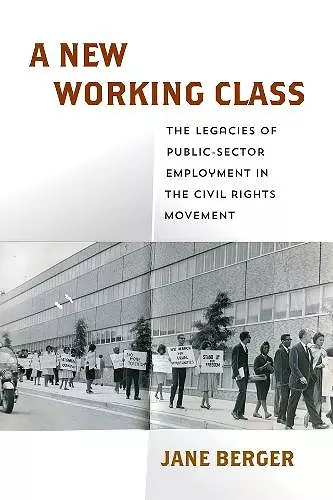A New Working Class
The Legacies of Public-Sector Employment in the Civil Rights Movement
Format:Hardback
Publisher:University of Pennsylvania Press
Published:15th Oct '21
Currently unavailable, and unfortunately no date known when it will be back

This book explores the struggles of Black public-sector workers in Baltimore, highlighting their fight for racial and economic justice amid challenging political landscapes.
For decades, civil rights activists have been at the forefront of the struggle against employment discrimination, advocating for a more significant role for African Americans in municipal decision-making. As their influence grew within city halls nationwide, they seized the opportunities presented by the Great Society, which created numerous local government jobs. A New Working Class delves into the efforts of Black public-sector workers and their unions as they fought for racial and economic justice in Baltimore. This sector became a vital employment avenue for many Black workers, particularly women, marking a notable yet often overlooked achievement of the civil rights movement.
A dedicated group of Black public-sector workers took on the mantle of activism from their government positions, striving to enhance public services while simultaneously advocating for their rights as employees. Despite the challenges posed by deindustrialization and a decline in union power, these workers and their unions were just beginning to make their mark. During the 1970s and 1980s, both Democratic and Republican administrations enacted policies that threatened the progress made by these workers, leading to significant funding cuts and a reduction in government services.
As federal officials justified their austerity measures by criminalizing Black urban residents, including those within the public sector, local officials responded to economic pressures by slashing government jobs and services. This combination of federal and local policies heightened insecurity in already hyper-segregated and over-policed low-income Black neighborhoods, compelling residents, especially women, to fend for themselves or go without the essential services that public-sector workers had fought hard to deliver in A New Working Class.
"The book is a local history, thick with mentions and stories of both public actors and ordinary people known only to family and friends. It contextualizes their conditions and activism in the national economy, cultural trends, and, centrally, federal policy that influenced the availability of money to the city...Historians, policy analysts, urban scholars and practitioners, and Baltimoreans will find much of interest in this book. But they will not escape its disturbing lesson. American cultural and institutionalized assumptions about race limit Blacks’ opportunities and challenge their dignity. And those who make public policy seem to have greater stakes in maintaining these conditions than ending them." * Journal of Urban Affiairs *
- Winner of Winner of the David Montgomery Award, granted by the Organization of American Historians 2022 (United States)
- Winner of Winner of the Scholars Award, granted by the Baltimore City Historical Society 2024 (United States)
ISBN: 9780812253450
Dimensions: unknown
Weight: unknown
336 pages